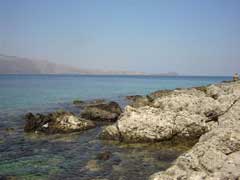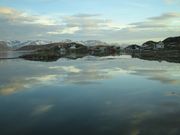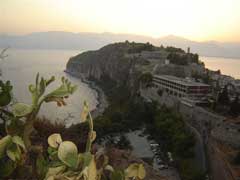 Conclusions of the e-conference on Water Research and the Improvement of WASH services for the Poor
Conclusions of the e-conference on Water Research and the Improvement of WASH services for the Poor
Dear participants,
at the end of this round of messages (indeed the e-conference has formally
come to its end, although the forum will remain open for some time), I wish
to thank you for your interesting contributions and hope the discussions
will continue among us through other channels or in private. I therefore try
to summarize in brief the issues highlighted so far (apologising if someone
will not feel completely interpreted by my points):
* The sectorial and fragmented nature of the sanitation initiatives carried
out by the public administrations of certain countries and a substantial
rigidity in the choice of the technological and organizational solutions
(for example, distribution networks with public taps, mandatory associative
organisation for collecting charges) (Darghouth Aziza, Tunisia; Raquel
Alfaro, Chile).
* The necessity, in countries experiencing strong competition between
different uses of water, to introduce alternative sources of water supply,
such as sea water or waste water, and the importance of research on new
treatment processes as an opportunity also of reducing costs by maintaining
an adequate availability of water resources (Gianfrancesco Costantini, Italy
and Fiji).
* The necessity of developing innovative technologies for water production
and sanitation management that make it possible to reduce the importance of
economies of scale, leaving behind the old system based on the transport of
water from distant sources (Raquel Alfaro, Chile).
* The possibility of providing public incentives to the water service
management (for example, tax reductions) so that they might commission
research aimed at increasing the efficiency of the services (for example,
analysis of infrastructures, consumption, leakages, illegal connections,
etc.) (Raquel Alfaro, Chile).
* The contribution of biotechnologies to the improvement of water
production: they can be used for cleaning wastewater making it possible to
re-use it in irrigation; they can provide low-cost ways of collecting water
in more arid regions (Daguia Olga, Benin; Otiso Kefa, USA).
* The relationship between water management and food self-sufficiency of
populations, especially in Africa: indispensability of the first in
achieving the second (Daguia Olga, Benin; Otiso Kefa, USA).
* The new initiatives for the development of the hydroelectric potential of
Africa and its positive repercussions also for water supply (in that they
will supply the necessary energy to pump the water to the places where it is
consumed) (Daguia Olga, Benin; Otiso Kefa, USA).
* The potentialities of the Internet dissemination of information on water
and sanitation among local communities and the importance of involving
students as gatekeepers, in the face, however, of the still inadequate
Internet access in developing countries (Rajola Vikram, India; Daguia Olga,
Benin).
* The weakness of water research in some African countries, due to: lack of
centres; lack of communication between the centres and with the outside
world; lack of statistics; lack of knowledge on innovation fields; lack of
financial resources in order to apply innovative technologies (Adkambi
Fakoree Moreniké, Benin).
* The lack of mechanisms for sharing and applying local solutions to water
problems and the growing dependency of local communities on NGOs for the
identification of such solutions (Otiso Kefa); in more general terms, the
role of intermediary organizations in matching demand with the supply of
technological solutions (Gianfrancesco Costantini, Italy and Fiji).
* The existence of numerous research results that are wasted and the
necessity for greater internal communication within the scientific community
and between this and the other stakeholders (Jauad El Kharraz,
France).
* The necessity of concentrating research in the areas where there are
significant information gaps to be bridged regarding high risk performance
areas and where capacities are crucial (Jauad El Kharraz, France).
* The necessity for an effort on the part of the research world to make
technological transfer site-specific and in order to support the use of new
innovative systems of service supply, but also the use of traditional
systems such as rainwater harvesting where appropriate (Jauad El Kharraz,
France).
* The importance, also for research purposes, of looking after basic
sanitation and hygiene education, with particular attention on rural areas
where greater obstacles are encountered because of the lack of resources and
capacities (Jauad El Kharraz, France).
* The launch of new initiatives for disseminating knowledge on water and the
environment (for example, EMWIS – The Euro-Mediterranean Information System
on the know-how in the water sector), ENVIS (Environmental Information
System) at Sulabh Intenational (Jauad El Kharraz, France; Vikram Rajola,
India).
Thank you again for your participation.
Best wishes,
Alessandra Cancedda
CERFE
Moderator
| Contact information |
Alessandra Olmi
(email: alessandra.olmi@cerfe.org) |
|---|---|
| News type | Inbrief |
| File link |
http://www.cerfe.org/forum/thread.asp?Id=49 |
| Source of information | CERFE |
| Keyword(s) | access to water and sanitation |
| Subject(s) | DRINKING WATER AND SANITATION : COMMON PROCESSES OF PURIFICATION AND TREATMENT |
| Geographical coverage | Italy |
| News date | 10/07/2006 |
| Working language(s) | ENGLISH |
 you are not logged in
you are not logged in





